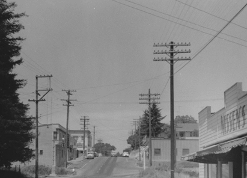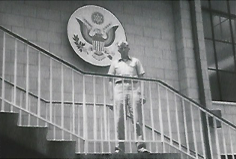Finding Ray Mathews
Guest Interview
One of the best parts of working as the History Room Librarian at the library is being a part of the larger community of historians. Included in this community are those who have lived here a long time and have memories of growing up in, or just outside of town. I’m always reminded of journalist J.P. Hartley’s famous quote: “The past is a foreign country. They do things differently there” when I read or listen to these stories because sometimes it truly feels like we are visiting a different place.
In 1951, Jack Withington was an 11 year old living in Penngrove, which at the time boasted a population of about 400.
“There was plenty to do for those of us who lived on the farms and ranches in and around the village,” Withington said, “but sports and similar activities were few and far between. When we did have free time, we jumped on our bicycles and headed for downtown Penngrove. One of our favorite pastimes was to stop at Vic’s Place located where the Penngrove Pub now stands, which offered a pool table, candy and scoops of all flavors of ice cream.”

Penngrove Main Street, 1950s
(Sonoma County Library photo: 014923)
Jack frequently noticed the many bowling trophies displayed on the wall behind the bar. Being an inquisitive boy, he asked the proprietor, Vic Mathews who operated the bar/poolroom with his wife Helen, if the trophies were his. “No, they are my son, Ray’s” Vic told him.
Despite his many visits to Vic’s Place, Jack never knew he had a son. Vic subsequently told him that his son Ray was a sailor in the U.S. Navy, and regaled him on later visits with stories of Ray’s adventures at sea around the world. Throughout his high school years, Vic’s Place became Jack’s “go-to place,” where he never tired of hearing about Ray.
Upon graduating from Petaluma High in 1958, Jack signed up for a four-year hitch in the Marine Corps as a way to see something of the larger world. It wasn’t until he was waiting for the bus with his family at the Greyhound bus station at 4th and C streets in Petaluma, that Jack realized that he was truly leaving his small town. As an unfamiliar bittersweet feeling came over him, Jack turned to his father and, in a very unaccustomed manner, gave him a big hug and a kiss.
“I was on way to boot camp on the southbound Greyhound bus to San Francisco,” Jack said, “then on to San Diego to the Marine Corps Recruit Training Base. Three days after arriving in boot camp, I was called in to the Quonset hut duty office and was told my dad had died.”
Jack immediately returned home to Penngrove, where he buried his father, before returning to camp.
“After boot camp, I was assigned to duty as a ‘grunt.’ My job, among other duties, was to carry a Browning Automatic Rifle and get used to its workings. After almost two years of stateside duty, we were shipped to Okinawa, where we were called to many “hot spots” in South East Asia. Our transportation was usually a World War Two vintage attack transport, or APA, which some may remember from old war movies. We had to disembark at sea by climbing down cargo nets.”
After leaving Okinawa, the ship visited the port of Subic Bay in the Philippine Islands.
“I knew that the Philippines had been ceded to the U.S. by Spain at the conclusion of the Spanish- American War,” Jack said, “so I wasn’t too surprised to see when we landed that we were surrounded by other American vessels. The weather in Subic Bay was hot and muggy, definitely not weather we were accustomed to, but we soldiered on and completed our duties as assigned.”

Jack - 1958
One day, Jack decided to walk around the area and explore its many offerings.
“As I was nearly always thirsty in this weather, I went into the nearest building, which turned out to be the base bowling alley. I bought a soft drink, and to pass the time, I watched the men bowling. I was immediately taken back in my mind to Vic’s Place. The men bowling were all Navy personnel with their names stenciled on the sides of their trousers. I spied a bowler with the name “Matthews” stenciled on the side of his. Could this be Ray Matthews, I wondered, from Penngrove? I walked over and asked, “Are you Vic Mathews’ son from Penngrove?”
“Yes,” the man said.
“And with that, I found myself face-to-face with Ray Mathews, the bowling champion whose adventures around the world I had grown up listening to, and which had inspired me to join the Marines, standing in a bowling alley nearly 7,000 miles from Penngrove.”

